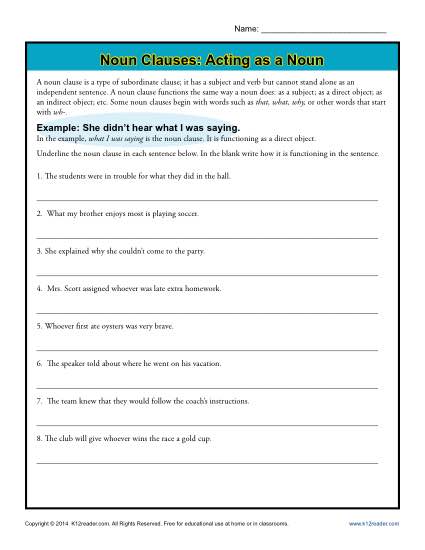If the sentence is still grammatically complete, then the part you replaced is a noun clause. It can be the subject or the object of the verb. You may also be interested in Noun clauses are usually introduced by the subordinating conjunctions that, why, how, if and whether. He will fight to the finish.

(the only exception to this rule is …
A noun clause adds crucial information to a sentence. He says that he will fight to the finish. This page has lots of examples of noun clauses and an interactive exercise. Become comfortable with the concept by reading through this helpful guide! It can be the subject or the object of the verb. Fill in the blanks with an appropriate subordinating conjunction. (the only exception to this rule is … Like all clauses, a noun clause has a subject and a verb. A noun clause can always be replaced by a single pronoun (such as you, he, she, it, they, there, etc.), the same way a normal noun would. You may also be interested in That was the verdict of the court. How to identify a noun clause. Combine each of the following pairs of sentences into a complex sentence using a noun clause.
How to identify a noun clause. By breaking down the sentence into simpler parts, you can find noun clauses easily. Noun clauses are usually introduced by the subordinating conjunctions that, why, how, if and whether. He says that he will fight to the finish. A noun clause adds crucial information to a sentence.

Become comfortable with the concept by reading through this helpful guide!
A noun clause may have you questioning your grammar knowledge. That, which, who, whoever, whomever, whose, what, whatever, how, when, where, whether and why (dr. The mistake was committed by the … Like all clauses, a noun clause has a subject and a verb. A noun clause can always be replaced by a single pronoun (such as you, he, she, it, they, there, etc.), the same way a normal noun would. Combine each of the following pairs of sentences into a complex sentence using a noun clause. A noun clause can act as the subject or object of the verb in the main clause. He will get good marks. Become comfortable with the concept by reading through this helpful guide! Noun clauses are usually introduced by the subordinating conjunctions that, why, how, if and whether. You may also be interested in How to identify a noun clause. Another difference is that while independence is impossible for noun clauses, noun phrases are independent.
That was the verdict of the court. The mistake was committed by the … Become comfortable with the concept by reading through this helpful guide! The noun clause, just like all clauses, will have a subject and a predicate. That, which, who, whoever, whomever, whose, what, whatever, how, when, where, whether and why (dr.

A noun clause can always be replaced by a single pronoun (such as you, he, she, it, they, there, etc.), the same way a normal noun would.
You may also be interested in Noun clauses are usually introduced by the subordinating conjunctions that, why, how, if and whether. A noun clause can always be replaced by a single pronoun (such as you, he, she, it, they, there, etc.), the same way a normal noun would. Noun clauses are usually introduced by the words (relative pronouns): Noun clauses can function as subjects, objects, or complements. An example is given below. If you are uncertain whether a part of a sentence is functioning as a noun clause, try replacing it with a pronoun; A noun clause may have you questioning your grammar knowledge. He will get good marks. It can be the subject or the object of the verb. I believe that he is innocent. If a dependent clause can stand in for a person, place, or thing, then it's a noun clause. That was the verdict of the court.
What Is A Noun Clause - He will fight to the finish.. A dependent clause is a phrase that can't stand on its own as a complete sentence. He will get good marks. (the only exception to this rule is … How to identify a noun clause. If you are uncertain whether a part of a sentence is functioning as a noun clause, try replacing it with a pronoun;

0 Komentar